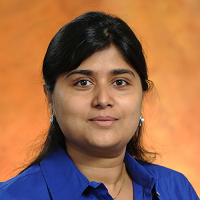 Subrata Acharya
Subrata Acharya
Lead Program Officer, CISE Research Expansion
NSF
Dr. Subrata Acharya is a computer scientist and the Lead Program Officer for research expansion efforts across the National Science Foundation’s Computer and Information Sciences and Engineering Directorate. Prior to her tenue at CISE, she has served as a Program Officer and disciplinary expert with the NSF Office of Integrative Activities for the Research Capacity and Competitiveness Program. She currently manages a large portfolio of cooperative agreements, standard and continuation grants, aimed at building research capacity, promoting entrepreneurship, stimulating workforce development, and broadening participation across the national STEM enterprise. She leads the CISE Research Expansion Programs and is the CISE co-lead for various NSF cross divisional and cross directorate programs including Expand AI, CISE Research Expansion, HBCU-Excellence in Research, Office of Advanced Cyberinfrastructure Campus Cyberinfrastructure, Smart Health and Biomedical Research in the Era of Artificial Intelligence and Advanced Data Science, and NSF INCLUDES Big Idea. She has served as a disciplinary expert and external evaluator for the National Security Agency and Department of Defense in the area of Cyber Operations, Risk Management and Compliance. She is an ardent advocate to promote equity and advancement of computing research in all aspects of scientific discovery across our nation.
For over twenty years, prior to Dr. Acharya’s tenure at NSF, she has successfully lent her expertise in leading various academic and leadership positions in collaboration with federal, state, and industrial partners. She received her Ph.D. in Computer Science (Major: Network Security) from the University of Pittsburgh and M.S. in Computer Engineering (Major: Embedded Systems) from Texas A&M University-College Station. She has served for over fourteen years as a tenured Professor in the Department of Computer and Information Systems at the University System of Maryland-Towson.
 Sharmistha Bagchi-Sen
Sharmistha Bagchi-Sen
Program Director, CISE OAC (Cyber Training)
NSF
Sharmistha Bagchi-Sen completed her doctoral work at the University of Georgia. Her research interests are transdisciplinary in the fields of international business, innovation ecosystems, and urban-regional restructuring. In international business, she has worked on the spatial and temporal dynamics of foreign direct investment, internationalization of pharmaceutical companies, and the importance of collaboration in innovation in the bioeconomy. She was one of the first group of visiting faculty members at the School of Business, Economics and Law at Gothenburg University, Sweden. She is currently a member of the International Academic Advisory Council at the School of Business, Economics and Law.
She has undertaken NSF-funded research on various aspects of high technology industries. One of her first NSF-funded research projects was on understanding the importance of clusters and collaboration in innovation within small and medium companies in the biotechnology industry. An extension of this research was to study the evolution of ecosystems in biopharma in India and the United Kingdom. This was followed by another NSF-funded study of renewable energy firms and their competitive (innovation and collaboration) strategies. One of her interests has been to study energy transition patterns across the developing world to explore policy-practice mismatch.
In the area of high technology’s impact on society, her collaborative NSF research on workforce development in the United States was one of the first to offer an understanding of women in cybersecurity. In recent years, she has been studying urban and regional restructuring in the United States with a focus on the role of demographic, economic, and technological shifts. She published a book, based on collaboration with her students, entitled Shrinking Cities: An Understanding Urban Decline in the United States. Her recent work is focusing on a comparative analysis of growing and declining regions across the United States.
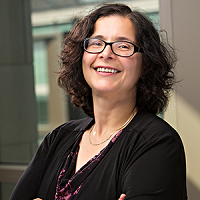 Dilma Da Silva
Dilma Da Silva
Acting Assistant Director, CISE
NSF
Dilma Menezes Da Silva is a Brazilian-American systems software researcher known for her work in cloud computing. She holds the Ford Motor Company Design Professorship II at Texas A&M University, and is head of the Department of Computer Science and Engineering at Texas A&M.
She has been a Division Director for Computing and Communication Foundations at the NSF since June 2022. In December 2023, she has been named as the acting assistant director of Computer and Information Science and Engineering (CISE) at the National Science Foundation.
 Jacqueline El-Sayed
Jacqueline El-Sayed
CEO and Executive Director
ASEE
Dr. Jacqueline El-Sayed is the CEO and Executive Director for the American Society for Engineering Education. She has leadership experience with the entire pipeline of engineering education and most recently served as the Chief Academic Officer & Vice President for Academic Affairs at Marygrove College. She is a professor emerita of mechanical engineering and served on the faculty at Kettering University for 18 years, eventually earning the position of Associate Provost. In addition to her work in academia she has served in industry and government. She is a four-time gubernatorial appointee to the Michigan Truck Safety Commission and, as commissioner, served as chair for two terms. She also chaired the Driver’s Education Advisory Committee and the Motorcycle Safety Advisory Committee for the Michigan Department of State—work that resulted in new legislation for Michigan. She began her career as an engineer for General Motors Truck Group and has been nationally recognized in higher education as both an American Council on Education Fellow and a New Leadership Academy Fellow.
As an ACE Fellow she was placed at Harvey Mudd College, visited over 30 campuses, and completed a national benchmark study on experiential education. The study’s recommendations were then implemented at her home institution. Dr. El-Sayed served on the Bloomfield Hills Board of Education for 10 years. Currently, Dr. El-Sayed serves on the WEPAN (Women in Engineering ProActive Network) Board of Directors and on the Advancement Committee for the Society for College and University Planning (SCUP). She is married and has three adult children.
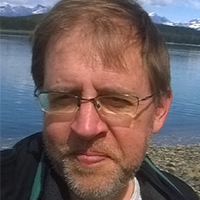 Rob Fatland
Rob Fatland
Director of Cloud and Data Solutions
University of Washington and CloudBank
Rob Fatland is the UW Director of Cloud and Data Solutions. He has formerly worked at NASA and Microsoft Research and has a PhD in Geophysics. His interests are in data science across the full spectrum from acquisition to collaboration with emphases on remote sensing, sensor networks, visualization, data systems and (domain-wise) the earth’s hydrosphere. He also devotes time and energy to K12 STEM education.
 James E. Fowler
James E. Fowler
Program Director, Communications and Information Foundations (CIF) Division
NSF
James E. Fowler is currently on detail as a program director in the Communications and Information Foundations (CIF) cluster of the Computing and Communication Foundations (CCF) division of the Computer & Information Science & Engineering (CISE) directorate of the National Science Foundation (NSF).
James E. Fowler is currently a William L. Giles Distinguished Professor in the Department of Electrical and Computer Engineering at Mississippi State University, Starkville, MS. He holds a Billie J. Ball Endowed Professorship. He has held visiting professor positions in the Département Traitement du Signal et des Images at Télécom ParisTech, Paris, France, and at Polytech Nantes, Nantes, France. He held a postdoctoral research position in the Laboratoire I3S at the Université de Nice—Sophia Antipolis, Sophia Antipolis, France.
He was the Editor-in-Chief of IEEE Signal Processing Letters from 2017–2019, and was previously a Senior Area Editor for IEEE Transactions on Image Processing and previously an Associate Editor for IEEE Transactions on Computational Imaging, IEEE Transactions on Image Processing, IEEE Transactions on Multimedia, and IEEE Signal Processing Letters. He is an Associate Editor for the EURASIP Journal on Image and Video Processing.
He is currently the Past Chair of the Computational Imaging Technical Committee of the IEEE Signal Processing Society. He was the Chair of the Image, Video, and Multidimensional Signal Processing (IMVSP) Technical Committee of the IEEE Signal Processing Society for 2012–2013, having served as also as Vice Chair and Past Chair. He is currently a member of the Conferences Board and Education Board was previously a member of the Publications Board of the IEEE Signal Processing Society. He was a member of the Strategic Planning Committee of the IEEE Publication Services and Products Board in 2013. He is a Fellow of the IEEE.
He is currently general co-chair of the Data Compression Conference, and he was general co-chair of the 2014 IEEE International Conference on Image Processing, Paris, France. He received the B.S. degree in Computer and Information Science Engineering and the M.S. and Ph.D. degrees in Electrical Engineering all from the The Ohio State University.
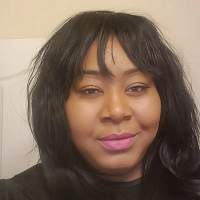 Jannele Gosey
Jannele Gosey
Grants Management Specialist
NSF
Jannele Gosey is a Team Leader (Senior Grants Management Specialist) at the National Science Foundation who oversees and facilitates the assignments of the Grant Specialists for the Computer Information Science and Engineering (CISE) and the Office of Integrative Activities (OIA) Directorates. In addition to serving her current directorates, in the past she has administered the grants, cooperative agreements, and fellowships for Top 150, HBCU, Tribal and Native American, Community College and Hispanic Serving Institutions.
She has been employed at the National Science Foundation for 27 years, all within the Directorate for Budget, Finance, and Award. Her previous positions include Senior Payroll Technician (8 years) and Contracts Specialist (13 years). She has earned a Bachelor of Science in Business Administration from Bowie State University and a Master of Arts in Procurement and Acquisitions Management from Webster University in 2014.
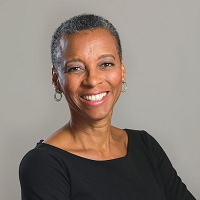 Camille McKayle
Camille McKayle
Provost and Vice President of Academic Affairs
University of the Virgin Islands (UVI)
Dr. Camille A. McKayle is Provost and Vice President of Academic Affairs at the University of the Virgin Islands (UVI). Previous to this, she served as Dean of the College of Science and Mathematics and was Program Officer at NSF (2005-2008) for the HBCU Undergraduate Programs. As Provost, she spearheaded the development of UVI’s inaugural PhD program in Creative Leadership for Innovation and Change, which graduated its first PhD recipients in 2018.
Dr. McKayle has successfully led various grant projects from National Science Foundation, NASA, Department of Defense, and the Mathematical Association of America. Currently, she is the lead Principal Investigator for the NSF HBCU-UP Broadening Participation Research Center, The Center for the Advancement of STEM Leadership (CASL), a collaborative effort with North Carolina A&T State University, the Association of American Colleges & Universities, and Fielding Graduate University.
Dr. McKayle received her Ph.D. in Mathematics, from Lehigh University (Pennsylvania). Her undergraduate degree in Mathematics is from Bates College (Maine). Additionally, she holds a Master’s Certificate in Creativity and Change Leadership from Buffalo State College’s International Center for Creativity Studies. Her current research interests are in the areas of Creativity Studies, Creativity and Leadership, STEM Education and STEM Leadership. She has written a number of articles on leadership in higher education, and in particular at HBCUs.
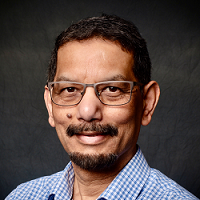 Deepankar (Deep) Medhi
Deepankar (Deep) Medhi
Program Director, Computer & Network Systems (CNS) Division
NSF
Deepankar (Deep) Medhi is a Program Director in the Computer & Network Systems (CNS) Division at NSF. He manages several research infrastructure programs such as NSFFutureCloud, Mid-Scale Research Infrastructure, Cloud Access, CIRC, and MRI, as well as wired networking research programs in the Networking Technologies and Systems (NeTS) cluster in CNS.
He was a Curators’ Distinguished Professor in the Department of Computer Science and Electrical Engineering at the University of Missouri-Kansas City (UMKC), which he joined in 1989 and retired in 2022. He was a rotating program director at NSF from August 2018 to August 2022 (on leave from UMKC). He started his permanent appointment at NSF in September 2022.
He received B.Sc. in Mathematics from Cotton College, Gauhati University, India, M.Sc. in Mathematics from St. Stephen’s College, University of Delhi, India, and his M.S. and Ph.D. in Computer Sciences from the University of Wisconsin-Madison, USA. Prior to joining UMKC in 1989, he was a member of the technical staff at AT&T Bell Laboratories where he worked on teletraffic network routing and design. While at AT&T Bell Labs, he co-developed Facility Diverse Routing – a feature deployed in AT&T’s nationwide dynamic routing network.
His testbed and infrastructure experience include an IP/ATM multilayer resilient network testbed development (funded by DARPA), feasibility study on MPLS (for Sprint’s network), Broadband Fixed-wireless protocol and feasibility analysis (for Sprint), Great Plains Environment for Network Innovation (GpENI) testbed development, and several networking experimentations on the GENI testbed.
His research interests are in network resilience, network routing and optimization, traffic engineering and design, network management, data center networking, video quality-of-experience, and huge scientfic workflows. He is deeply interested in research infrastructures that can benefit the research community. He is a Fellow of the Institute of Electrical and Electronics Engineers (IEEE).
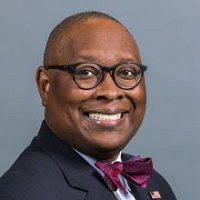 James L. Moore III
James L. Moore III
Assistant Director, Directorate for STEM Education (EDU)
NSF
As a member of the executive leadership team at the National Science Foundation (NSF), Dr. James L. Moore III is the Assistant Director for the Directorate for STEM Education (EDU). With an annual budget of over $1 Billion and personnel oversight for nearly 200 employees, he serves as the senior leader for EDU, which supports science, technology, engineering, and mathematics (STEM) projects focusing on K-12 education, undergraduate and graduate education, workforce and human resource development, and learning in formal and informal settings. Prior to his NSF appointment, Dr. Moore served, for over five years, as the university’s vice provost for diversity and inclusion, chief diversity officer, and leader of the Office of Diversity and Inclusion (one of the nation’s oldest, largest, and most comprehensive office of its kind) at The Ohio State University. From 2015 to 2017, he served as a program director for Broadening Participation in Engineering in the Directorate for Engineering at NSF, and, during that time, he was one of the program directors who helped launch the highly acclaimed, cross-directorate, NSF INCLUDES, a $100 million plus national broadening participation in STEM initiative. From 2011 to 2015, he was an associate provost for diversity and inclusion at The Ohio State University, where he managed numerous nationally-acclaimed programs and units.
Dr. Moore is nationally-recognized for his work on African American males, and he has served on The Ohio State University’s faculty, since 2002. He is the first executive director for the Todd Anthony Bell National Resource Center on the African American Male and is the inaugural EHE Distinguished Professor of Urban Education at The Ohio State University. His research agenda focuses on school counseling, gifted education, urban education, higher education, multicultural education/counseling, and STEM education, and Dr. Moore is often quoted, featured, and mentioned in popular publications, such as the New York Magazine, New York Times, St. Louis Post-Dispatch, Columbus Dispatch, Spartanburg Herald, Cincinnati Enquirer, Journal of Blacks in Higher Education, Chronicle of Higher Education, and Diverse: Issues in Higher Education. Since 2018, he has been cited annually by Education Week as one of the 200 most influential scholars and researchers in the United States.
 Michelle L. Rogers
Michelle L. Rogers
Expert, CISE Directorate
NSF
Michelle L. Rogers, PhD, is an associate professor in the College of Computing and Informatics at Drexel University. For the previous 2 years, she served as a Program Director for the National Science Foundation in the Computing and Networking Systems (CNS) division of the Computer and Information Science and Engineering (CISE) directorate. There she worked on Broadening Participation in Computing and research capacity building efforts across the CISE directorate.
For over 15 years, she has used human factors engineering methods and socio-technical systems theory to study the impact of health information technology (HIT) on clinical workflow and usability of technology with and by medically under-served populations. Most recently, Dr. Rogers has been investigating the usability and utility of patient portals and electronic medical records. Internationally, her investigations are focused on HIT in Ugandan health systems. In addition, she is collaborating with faculty from industrial design, dance, and education to understand how making, arts, and coding can assist in making the realization of a career in STEM fields achievable – Black Girls STEAMing through Dance (BGSD). She holds graduate degrees in Industrial Engineering (University of Wisconsin – Madison) and undergraduate degrees in electrical engineering (Spelman College and Georgia Tech).
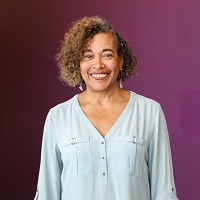 Bevlee Watford
Bevlee Watford
Professor, Engineering Education
Associate Dean, Academic Affairs
Director, Center for Enhancement of Engineering Diversity
College of Engineering, Virginia Tech
Dr. Bevlee A. Watford, P.E. is a Professor of Engineering Education, Associate Dean for Equity and Engagement, and the Founding Executive Director of the Center for the Enhancement of Engineering Diversity for the College of Engineering at Virginia Tech. She received her B.S. in Mining Engineering, and her M.S. and Ph.D. in Industrial Engineering and Operations Research from Virginia Tech.
In 1992, she became the founding Executive Director of the Center for the Enhancement of Engineering Diversity for the College of Engineering at Virginia Tech, and an associate professor of Industrial and Systems Engineering. In 1997 Watford became the Associate Dean for Academic Affairs in the College of Engineering. She earned her current rank of Professor of Engineering Education in 2005 and served as Interim Department Head from 2010-11. In 2019 she was named the Founding Associate Dean for Equity and Engagement.
She has secured more than $17 million dollars in funding and support for CEED and other undergraduate initiatives. Her research activities have focused on the recruitment and retention of students in engineering, with a particular emphasis on under-represented students. In 2008 Watford received the WEPAN Founders Award in recognition of her service to WEPAN and her efforts to increase the participation of women in the engineering profession. CEED received the 2010 Claire Felbinger Diversity Award from ABET and the 2011 NSBE-ExxonMobil Impact award for implementing successful research-based efforts to improve retention.
From 2005-2007, she served as a program manager in the Division of Undergraduate Education for the National Science Foundation, returning from 2013-2015 to serve as the program director for broadening participation in the Division of Engineering Education and Centers. In 2023 She was nominated by President Biden to serve on the National Science Board.
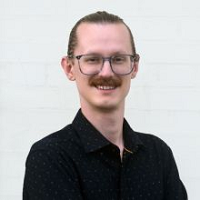 Dillon Watring
Dillon Watring
AAAS Science & Technology Policy Fellow, CISE IIS (Expand AI)
NSF
Dr. Dillon Watring is a mechanical engineer with years of experience in materials science research with focus on advanced experimental and characterization techniques. Watring comes to NSF from a National Research Council (NRC) Postdoctoral Research Associateship working at the U.S. Naval Research Laboratory where he has been using his knowledge in machine learning to develop new characterization tools. Prior to his postdoctoral associateship, he obtained his PhD in mechanical engineering at the University of Utah where he focused on investigations into processing-structure-property relationships in additively manufactured metals by leveraging data-driven and machine learning approaches. Watring studied at Florida International University for both his master’s and bachelor’s degree in mechanical engineering. Originally from Orlando, Florida, Dillon has enjoyed living and working in a variety of environments. He enjoys new challenges and is excited to start the AAAS fellowship. He has been part of the TMS Additive Manufacturing Committee, which helps organize symposiums for one of the largest materials conferences. In addition to his memberships in professional societies, he also has peer reviewed many top journals including Additive Manufacturing, Materials Science and Engineering A, the Journal of Materials Science, and more.
